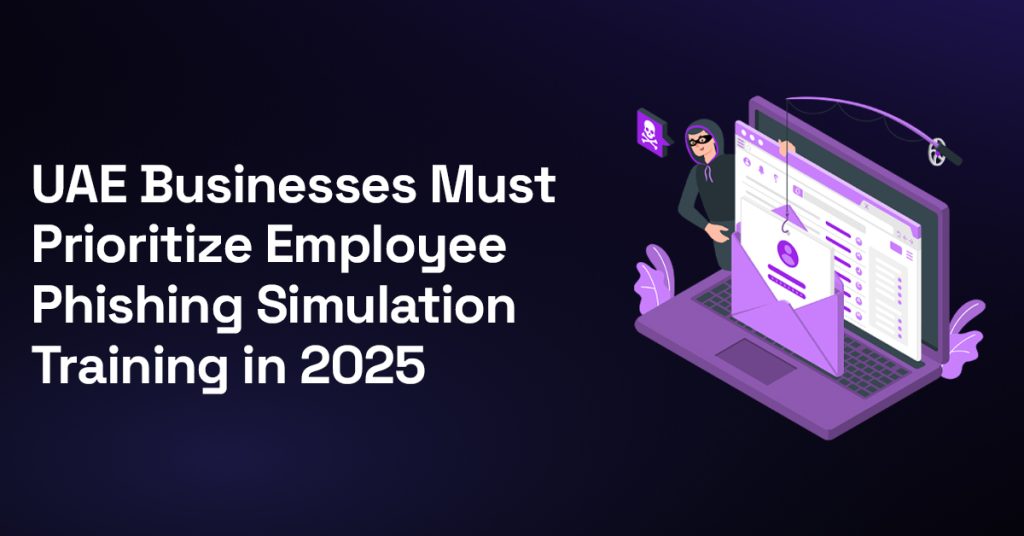Employee Phishing Simulation Training | Why UAE Businesses Must Prioritize in 2025

The UAE faces an unprecedented surge in cyber threats, with the UAE Cybersecurity Council reporting that the country prevents or mitigates a daily average of 50,000 cyberattacks on key sectors, while ransomware attacks increased 32% year-over-year in 2024.
As Dubai solidifies its position as a global technology hub, organizations must focus on comprehensive Phishing Simulation training programs to prevent damage from cyber attacks. Simulated phishing attacks have emerged as the most effective method for building cyber resilience, transforming employees from potential vulnerabilities into active defenders of organizational security.
Understanding Simulated Phishing Training
Simulated phishing training represents a paradigm shift from passive learning to active engagement. Unlike conventional security workshops, this approach places employees in realistic threat scenarios where they must apply cybersecurity knowledge under pressure. The best phishing simulator platforms create authentic experiences that mirror actual attack methodologies while providing safe learning environments.
Modern simulation platforms utilize behavioral science principles to create lasting behavioral change. By integrating AI, behavioral science, and advanced automation, advanced platforms facilitate fully automated behavior change, enhancing protect-detect-respond capabilities. This approach recognizes that cybersecurity awareness requires emotional engagement and practical application rather than mere information transfer.
Why UAE Businesses Must Prioritize Employee Phishing Simulation Training?
The Alarming Cybersecurity Threats in the UAE
The UAE’s cybersecurity environment presents unprecedented challenges that demand immediate attention from business leaders. The UAE Cyber Security Council reports blocking over 200,000 cyberattacks daily from terrorist groups across 14 countries, representing a dramatic escalation in threat frequency and sophistication. This staggering volume of daily attacks underscores the critical importance of robust security awareness training Dubai organizations can implement to extend beyond traditional technological solutions.
The vulnerability exposure problem has reached critical levels. In 2025, over 223,000 vulnerable assets were exposed to potential attacks, a sharp increase from 155,000 in 2023. This 44% increase in exposed assets demonstrates how rapidly the attack surface is expanding as UAE businesses accelerate their digital transformation initiatives.
The Human Factor Crisis
The most concerning aspect of UAE’s cybersecurity challenge lies in human vulnerability factors. Global research shows that 68% of breaches were caused by human factors, with over three-quarters of CISOs in the UAE identifying human error as the leading cybersecurity risk, highlighting that employees represent both the greatest risk and the most critical opportunity for cybersecurity training UAE businesses must address.
The knowledge gap among technology professionals reveals the depth of the training challenge. If technology professionals struggle with phishing identification, imagine the vulnerability levels among general employee populations.
The emergence of AI-powered phishing attacks compounds these challenges significantly. These AI-enhanced threats exploit psychological triggers and cultural nuances specific to UAE business environments, making traditional awareness training methods increasingly ineffective.
The Economic Imperative
The financial impact of inadequate employee training extends far beyond immediate incident response costs. Cybersecurity Ventures estimates the value at $10.5 trillion by 2025, while another forecast mentions the cost of cybercrime at $23 trillion by 2027; organizations cannot afford to leave employee vulnerabilities unaddressed.
UAE businesses face additional economic pressures from regulatory compliance requirements and reputational risks associated with cyber incidents. The cost of reactive incident response far exceeds proactive phishing awareness training Dubai investments, making simulation programs a critical business continuity strategy rather than an optional security enhancement.
Thus, the urgency of implementing comprehensive simulated phishing training UAE organizations require cannot be overstated. As the UAE continues positioning itself as a global technology leader, organizations that fail to address human vulnerability factors will find themselves at significant competitive disadvantages while exposing stakeholders to unnecessary risks in an increasingly hostile cyber environment.
Phishing Simulation Implementation Strategies for UAE Businesses
Successful phishing simulation implementation requires careful planning. Molding strategies for UAE-based organizations is required for them to be fully effective.
1. Phased Deployment Approaches
Organizations should begin with baseline assessments to understand current vulnerability levels and identify high-risk user groups. Initial simulations should focus on fundamental threat recognition before progressing to more sophisticated attack scenarios.
Phase one typically involves simple email-based simulations using common attack templates. This establishes baseline metrics and introduces employees to the simulation concept without overwhelming less technically savvy staff members. Subsequent phases introduce increased complexity, including spear phishing, business email compromise scenarios, and multi-vector attacks.
2. Integration with Existing Security Infrastructure
Taking Action for Dubai’s Cybersecurity Challenges
Modern phishing simulation platforms must integrate seamlessly with existing security tools and incident response procedures. This integration enables organizations to correlate simulation results with real-world security events, providing comprehensive visibility into human risk factors.
simUphish offer real-time reporting capabilities that integrate with security information and event management (SIEM) systems. Advanced platforms provide real-time monitoring capabilities, scheduled reporting, and month-by-month progress tracking with declining phishing click rates. This integration ensures that human risk management becomes an integral component of overall cybersecurity strategy rather than an isolated training activity.
Compliance and Regulatory Considerations
UAE businesses must navigate complex regulatory requirements while implementing cybersecurity training programs. Leading platforms conduct privacy assessments and maintain GDPR compliance, requesting only necessary data for service delivery. This compliance framework extends to local UAE regulations and industry-specific requirements.
Organizations in regulated industries such as banking, healthcare, and government must ensure their training programs meet specific compliance mandates. Automated compliance reporting features help organizations demonstrate regulatory adherence while maintaining focus on security improvement objectives.
Measuring Training Effectiveness
Behavioral Metrics and Analytics
Effective phishing simulation programs require sophisticated analytics to measure behavioral change and program effectiveness. Traditional click-rate metrics provide insufficient insight into actual security improvement. Advanced platforms deliver quantifiable behavior transformation through comprehensive analytics that measure both immediate responses and long-term behavioral changes.
Modern analytics platforms track multiple behavioral indicators, including response time, reporting behavior, and knowledge retention over time. These metrics enable organizations to identify training gaps, optimize content delivery, and demonstrate return on investment for security awareness programs.
Continuous Improvement Frameworks
Successful training programs incorporate continuous improvement methodologies that adapt to changing threat landscapes and organizational needs. Regular assessment cycles ensure that training content remains relevant and effective while accommodating organizational growth and evolution.
Multilingual microlearning materials designed specifically for threats like QR phishing provide ongoing education that extends beyond one-time awareness sessions. This continuous learning approach ensures that employees maintain high levels of threat awareness despite the constantly evolving nature of cyber threats.
ROI Measurement and Business Value
Organizations must demonstrate tangible business value from phishing simulation investments. This requires measuring both direct security improvements and broader organizational benefits such as reduced incident response costs, improved compliance postures, and enhanced customer trust.
Advanced platforms provide comprehensive reporting that correlates training metrics with actual security incidents, enabling organizations to quantify risk reduction and cost avoidance. These measurements support budget justification and program expansion initiatives.
Best Practices for UAE Organizations
- Leadership Engagement and Cultural Change: Successful phishing simulation programs require strong leadership support and cultural alignment with organizational values. Leaders must demonstrate commitment to cybersecurity awareness through active participation and resource allocation. Organizations should frame security training as professional development rather than compliance requirements.
- Communication and Change Management: Transparent communication about simulation objectives builds trust and engagement rather than creating fear or resentment. Organizations should emphasize learning and improvement objectives while clearly explaining how training programs protect both organizational and personal interests.
- Continuous Learning Integration: One-time awareness sessions are insufficient for understanding complex threats like QR phishing. Organizations must integrate cybersecurity awareness into ongoing professional development programs to maintain high levels of threat recognition capability.
Conclusion
Training employees through simulated phishing attacks has become essential for UAE organizations facing increasingly sophisticated cyber threats. With over 50,000 daily cyberattacks targeting key UAE sectors and AI-enhanced phishing attacks expected to evolve significantly in 2025, comprehensive employee training represents a critical investment in organizational resilience.
Platforms like simUphish provide the advanced capabilities, cultural relevance, and behavioral science integration necessary to transform human vulnerabilities into organizational strengths. As the UAE continues its digital transformation journey, organizations that prioritize comprehensive cybersecurity training will gain significant competitive advantages while protecting their stakeholders, reputation, and business continuity in an increasingly complex threat environment.
FAQ's
- 1. Phishing simulation training: what is it?Employees are given simulated phishing emails, texts, or phone calls in a controlled environment as part of phishing simulation training, and their reactions are used to inform them.
- 2. Why should companies in the UAE give this top priority in 2025?Human-centric defences are more important than ever because cyber threats are increasing throughout the United Arab Emirates, and phishing is still one of the key ways that breaches occur.
- 3. How is security posture enhanced by simulation training?By strengthening awareness and response patterns, it transforms workers from possible liabilities into proactive defenders.
- 4. Which phishing techniques ought to be imitated?Key varieties include voice phishing (vishing), business email compromise (BEC), email phishing, SMS phishing (smishing), and credential-harvesting attacks.
- 5. How frequently should phishing simulations be conducted by employers?Depending on the degree of business risk, basic tests should ideally be conducted monthly, while more complex campaigns should be conducted quarterly.
- 6. Which metrics ought to be monitored by organisations?Click rates, time-to-report, re-attempt rates across departments, and reporting rates (the proportion of employees who report questionable items).
- 7. Is support from the leadership truly required?Indeed. Strong leadership backing ensures that the effort is perceived as constructive rather than punitive, facilitates resource allocation, and builds organisational trust.
- 8. How can phishing simulations be culturally appropriate in the United Arab Emirates?Utilise regional themes, incorporate suitable languages (such as English and Arabic), and adapt to the diverse communication styles of the workforce.
- 9. What occurs if a worker "falls" for a simulation?In order to encourage appropriate behaviour, they should be sent to a teaching site that explains the warning indicators they missed and provides them with a quick microlearning exercise.
- 10. How can one prevent employees from feeling unfairly singled out?Be open and honest about the goal, prioritise education above assigning blame, protect privacy, and permit opt-outs on individual accounts and devices.
- 11. In what ways might regulatory compliance be aided by simulation training?They fulfil audit obligations under UAE data or cybersecurity regulations by providing verifiable proof of proactive security awareness activities.
- 12. What function does analytics serve?Analytics make it possible to pinpoint weak points, customise training for high-risk populations, and track changes in behaviour over time.
- 13. Is it possible to include AI threats?Indeed, simulations ought to take into account new attack methods such as multi-channel phishing chains, deepfake voice calls, and AI-generated emails.
- 14. How profitable is training with phishing simulations?Training expenditures are usually outweighed by the avoided costs of breaches, lower remediation costs, enhanced reputation, and improved risk posture.
- 15. How does one begin using a program that simulates phishing?
Setting objectives, getting leadership support, conducting baseline testing, implementing frequent simulations, assessing outcomes, and iterating in response to data are the first steps.





https://shorturl.fm/je6HG
So, I tried dabethert last week. Registration was quick, and their customer support team were really helpful when I had a question. Games are OK, nothing too spectacular, but solid overall. Give them a look-see: dabethert
Win88apps, downloading now, hoping to win! Wish me luck, guys! Try those apps: win88apps
https://shorturl.fm/CJ6JU
https://shorturl.fm/ZaplN
Monetize your traffic with our affiliate program—sign up now!
If you’re looking for games, try gamesx66. It’s got a nice selection. The graphics are pretty good and load times are fast! gamesx66
Yo, check out betanp! Heard rumors they got some sweet odds. Gonna scope it out and see if it’s legit for myself. Fingers crossed!
Okay, so I’m looking for good customer support. Anyone had any experience with suportegalerabet? Quick responses a must!
Join our affiliate community and start earning instantly!
Yo, heard about bet100com? Man, they seem to have a decent selection. Just giving it a look-see, ya know? Definitely check out bet100com.
Holiganbettelegam, huh? The name kinda rolls off the tongue. I’m always looking for a new place to drop some coin. Check out holiganbettelegam, maybe we’ll hit the jackpot.
Anyone tried Jojobet5669? I’m thinking about throwing a few bucks their way. Fingers crossed! See for yourself at jojobet5669.
Join forces with us and profit from every click!